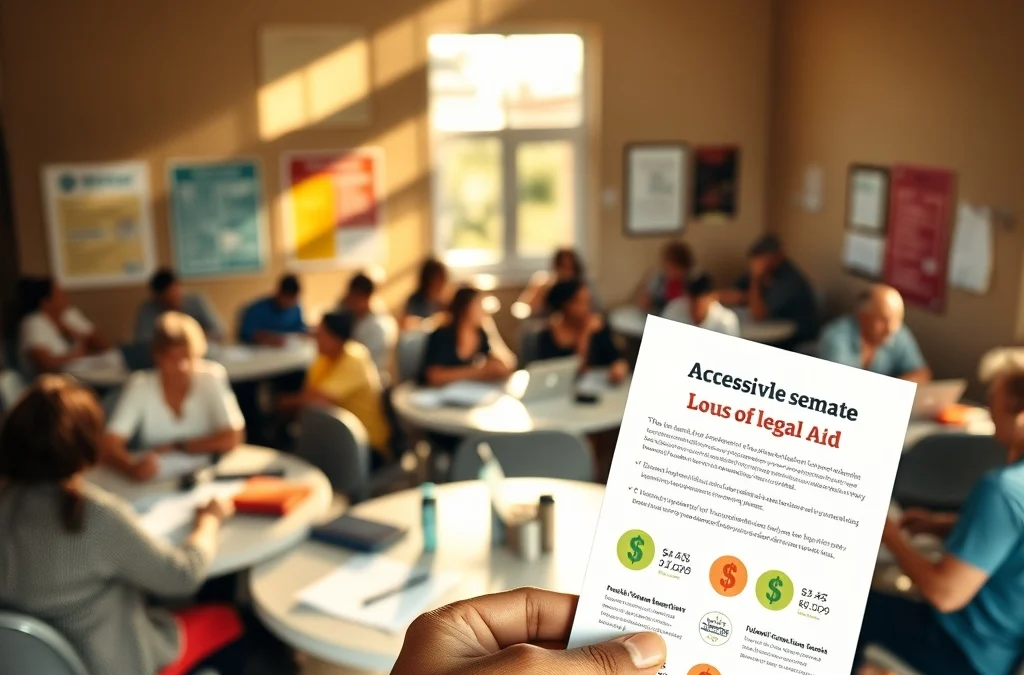10 Best Income Limits for Legal Aid Assistance
Many people underestimate the importance of income limits when it comes to legal aid assistance in the UK. These thresholds can significantly impact your access to essential legal support in serious situations. Understanding the various income limits and allowances could make a difference in your eligibility. What are the specific figures you need to know, and how do they apply to your circumstances? Let’s explore these critical details.
Key Takeaways
- The maximum gross monthly income threshold for legal aid assistance in the UK is £2,657.
- Individuals with disposable income below £315 are eligible for legal aid without any contribution.
- For civil cases, disposable capital must not exceed £8,000 to qualify for legal aid.
- Domestic violence cases can qualify for legal aid regardless of income limits.
- Specific state benefits, like Income Support and Universal Credit, automatically qualify individuals for legal aid assistance.
Maximum Gross Monthly Income for Legal Aid Eligibility
When you’re seeking civil legal aid in the UK, it’s crucial to know that your maximum gross monthly income shouldn’t exceed £2,657. If your income goes beyond this threshold, you won’t qualify for assistance.
Your gross income includes all earnings before any deductions, but certain benefits can automatically qualify you for legal aid, making the application process easier. Legal aid plays a crucial role in maintaining fairness in the legal system for those who cannot afford legal services. This support is aimed at individuals facing serious legal situations that they cannot navigate alone.
If you have more than four dependent children, your income limit increases by £222 for each additional child.
Disposable Income Limits for Civil Cases
| Income Limit | Eligibility Status | Notes |
|---|---|---|
| Below £315 | Eligible, no contribution | No contributions required |
| £315 – £733 | Eligible, contributions apply | Contributions based on income |
| Above £733 | Ineligible | No legal aid assistance available |
Be mindful that exceptional circumstances, like domestic violence cases, may waive these limits. Understanding these limits can significantly impact your access to justice.
Disposable Capital Limit for Legal Aid
The disposable capital limit for legal aid plays a crucial role in determining your eligibility for assistance in civil and criminal cases.
In Scotland, if you’re dealing with civil cases, the upper limit is £8,000, while for criminal cases, it’s set at £1,716. If you exceed these amounts, your case’s nature and potential undue hardship will be examined. Additionally, individuals on certain state benefits are automatically eligible for legal aid regardless of their disposable capital. Each application is assessed based on the applicant’s disposable income and capital.
In Northern Ireland, the limits vary from £1,000 to £1,635 based on dependants, with an additional £100 for each extra one.
Key considerations include disregarding the value of your main dwelling and household items.
Additional Income Allowance for Families With Extra Children
Families with extra children can benefit from an additional income allowance when applying for legal aid. If you have more than four dependent children, you can add £222 per month for each additional child.
For instance, if you have five children, your gross income threshold increases to £2,879 per month. With six children, it rises to £3,101, and for seven children, it reaches £3,323.
This allowance recognizes the financial demands of larger families, ensuring you receive the support you need. Remember, the calculation is based on your gross income before deductions, so it’s essential to assess your total earnings accurately.
This allowance can make a significant difference in your eligibility for legal aid.
Automatic Qualification Through State Benefits
For those relying on state benefits, automatic qualification for legal aid can simplify the process significantly. If you receive certain benefits, you might not need to navigate complex income tests. Here’s a quick overview of qualifying benefits:
| Qualifying Benefits | Legal Aid Eligibility |
|---|---|
| Income Support | Automatically qualifies |
| Income-based Jobseeker’s Allowance | Automatically qualifies |
| Income-related Employment and Support Allowance | Automatically qualifies |
| Universal Credit | Automatically qualifies (passporting) |
| State Pension Guarantee Credit | Automatically qualifies |
Using these benefits, you can access legal aid without the stress of additional financial assessments. It’s reassuring to know that support is available when you need it most. Additionally, automatic qualification applies if you are receiving or included in a partner’s benefits. Moreover, many individuals in deep poverty may also qualify for this important assistance, ensuring that legal aid is accessible to those who need it the most.
Special Considerations for Domestic Violence Cases
When facing domestic violence, understanding your legal rights and access to aid is crucial. Legal aid can be available even if you don’t meet typical income limits, recognizing the urgency of your situation.
Here are some special considerations:
-
Income Limits: You can qualify with a gross monthly income of £2,657, plus an extra £222 for each child beyond the first four.
-
No Upper Limits: There are no upper eligibility limits for protection orders related to domestic violence.
-
Evidence Requirements: You’ll need specific evidence like police reports or support letters, but alternative evidence may also be accepted. Many victims, however, have faced inadequate legal aid due to financial contributions required under new eligibility rules. Legal aid is essential for maintaining public confidence in legal processes and supporting vulnerable individuals during these critical times.
This tailored approach helps ensure you can access the legal support you need during this critical time.
Eligibility for Minors and Parental Financial Information
Understanding eligibility for legal aid as a minor often hinges on your parents’ financial situation. If you’re under 18, your parents’ income and capital are assessed unless exempt. This means that the obligation of aliment applies to ensure that parents’ resources are included in the financial assessments.
For legal aid, the gross monthly income limit is £2,657, with additional allowances for child dependents. Your family’s disposable income mustn’t exceed £733, and their capital should stay below £8,000. Certain benefits can automatically qualify you for the income test, but capital still needs evaluation. In specific tribunal cases, the means of foster parents may not be considered.
Each situation is assessed individually, ensuring that your unique circumstances are taken into account when determining eligibility for legal aid assistance.
Legal Aid Access for UK Citizens Abroad
If you’re a UK citizen living abroad and need legal assistance, it’s important to know that you can access legal aid in various countries.
Here’s how you can get started:
-
Contact Your Embassy: Reach out to the embassy, high commission, or consulate of the country you’re in for application instructions. The consular service can provide guidance on local legal resources available to you.
-
Get Application Support: The Legal Aid Agency aids with cross-border applications, ensuring you understand the process.
-
Utilize Translation Services: Publicly funded solicitors can help translate necessary documents, making the application smoother.
Exemptions for Forced Marriage and FGM Cases
Recognizing the urgent need for protection, the legal aid system in the UK offers exemptions for victims of forced marriage and Female Genital Mutilation (FGM) cases. These exemptions ensure that financial barriers won’t prevent you from seeking safety.
| Aspect | Details |
|---|---|
| Income Limits | Waived for forced marriage and FGM cases |
| Contribution Requirement | May apply based on individual financial situation |
| Legal Aid Coverage | Includes costs for Forced Marriage Protection Orders (FMPO) |
The Legal Aid Agency assesses each case individually, focusing on both merits and financial eligibility. This approach aims to support and empower you in difficult times, ensuring access to legal protection for those most vulnerable.
Importance of Legal Aid in Promoting Access to Justice
Legal aid plays a vital role in ensuring you can access justice, especially when financial resources are limited.
It’s essential for those who can’t afford legal representation, bridging gaps for disadvantaged groups.
Here’s why legal aid matters:
-
Promotes Fairness: Legal aid ensures vulnerable individuals receive the same legal protections as everyone else, fostering equality.
-
Supports Marginalized Communities**: It challenges discriminatory practices, giving a voice to those often overlooked in the justice system.
-
Strengthens Society: By encouraging lawful resolution of disputes, legal aid contributes to a more just and cohesive community.
Access to legal aid isn’t just a service; it’s a fundamental right that helps uphold the principles of justice for all.
Frequently Asked Questions
How Long Does the Legal Aid Application Process Usually Take?
The legal aid application process usually takes a few days for criminal and children’s cases, while civil applications can take up to 28 days. Ensure you provide all necessary information to avoid delays.
Can Legal Aid Cover Representation in Criminal Cases?
Imagine a lifeboat in stormy seas; legal aid serves as that lifeboat for you. Yes, it can cover representation in criminal cases, ensuring you navigate challenges with support during turbulent times. You’re not alone.
What Documentation Is Required to Apply for Legal Aid?
To apply for legal aid, you’ll need a client statement, supporting evidence, income details, and relevant documents. Ensure you provide photocopies, not originals, and include any applicable court documents for your case.
Is There a Limit on How Many Times I Can Apply for Legal Aid?
You can apply for legal aid as often as you need, like waves crashing on the shore. Each application stands alone, judged on its own merits, so don’t hesitate to seek the help you deserve.
Can I Appeal if My Legal Aid Application Is Denied?
Yes, you can appeal if your legal aid application’s denied. Gather necessary documentation, submit your appeal via the appropriate system, and ensure you provide a detailed justification for reconsideration of your case.
Related Articles
Finding Solicitors for Redundancy Disputes
Finding Solicitors for Redundancy Disputes When you're facing redundancy disputes in the UK, finding the right employment solicitor can significantly impact your outcome. You need to prioritize solicitors with a specialization in employment law, as their expertise can...
What Are the Steps to Apply for Legal Aid?
What Are the Steps to Apply for Legal Aid? Applying for legal aid is a structured process that can help you access the support you need. It starts with an online application and moves through several key steps. Understanding these steps is crucial to ensure you don't...
7 Steps to Access Support Services in the UK
7 Steps to Access Support Services in the UK Accessing support services in the UK can seem overwhelming, but it doesn't have to be. By following a structured approach, you can identify your needs and find the right assistance. Legal aid is also something you may be...
Accessing Free Legal Aid for Low-Income Families in the United Kingdom
Accessing Free Legal Aid for Low-Income Families in the United Kingdom Imagine facing a legal issue without the means to afford help—this is a reality for many low-income families in the UK. Fortunately, free legal aid is available, but navigating the process can be...
Legal Aid Options for Domestic Violence Survivors in the United Kingdom
Legal Aid Options for Domestic Violence Survivors in the United Kindom Did you know that legal aid options in the UK have evolved significantly to support domestic violence survivors? You might find it crucial to understand the eligibility criteria and the types of...
5 Essential Legal Aid Services for Families in the United Kingdom
5 Essential Legal Aid Services for Families in the United Kindom When life's challenges threaten family stability, understanding your legal options can feel like navigating a maze. You might be surprised to know that the UK offers vital legal aid services tailored...
Immigration Support Services in the UK
Immigration Support Services in the UK Over 600,000 people sought asylum in the UK in the last year alone, highlighting the critical need for effective immigration support services. You might wonder how these services operate and what challenges they aim to address....
What Are Legal Steps to Resolve Workplace Conflict?
What Are Legal Steps to Resolve Workplace Conflict? Research indicates that nearly 60% of employees experience workplace conflict, highlighting a pervasive issue that can disrupt productivity and morale. To effectively address such conflicts, it's crucial to...
What Are Your Workplace Rights in the UK?
What Are Your Workplace Rights in the UK? Imagine walking through a maze, each turn revealing a new right or protection that safeguards your experience as an employee in the UK. You're entitled to a written employment contract, paid leave, and a workplace free from...










